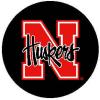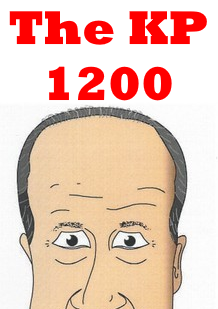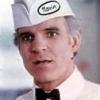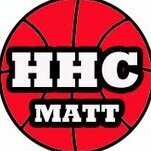Then & Now: Gerard Myrthil
Compiled By Dave Brandon (Photo Courtesy NU Media
Relations)
 Gerard
Gerard
Myrthil played for Nebraska from 1978-1979, and came to
Nebraska from the famed Laurinburg (NC) Institute.
Myrthil
saw his teams go 36-21 during his two years on the
hardwood in Lincoln, and played for the late Joe
Cipriano.
The 6'2"
guard is our latest interviewee in this Sunday's edition
of "Then & Now."
HHC: Thanks
for joining us. How long has it been since you talked
about Husker Hoops?
GM: Actually,
it’s been awhile because while I’ve been following them,
I don’t even know who the coaches are anymore.
I was
there with Moe Iba and Joe Cipriano, but after my
sophomore year, I got pushed out, and was basically told
they’d no longer honor my scholarship.
So, I
have mixed feelings about that, you know, I really do.
It wasn’t the best thing that happened for a brother,
being a Converse All-American my sophomore year (of high
school). So I barely ever talk about their basketball
program. I should have went with Tom Osborne when he
asked me to come out and play defensive back.
HHC: Sorry to
hear all that. You are originally from New York City,
New York, but attended Laurinburg (NC) Institute, where
you were captain of the basketball team as a senior and
averaged 24.0 PPG, 10.0 APG, and 7.0 RPG while leading
the team to a record of 18-2. What was that experience
like?
GM: It was the best times of my life, man.
The BEST. Those were three years that put my life back
on track, because before then, I was just a plain old
thug, idiot, with no schooling. I went to Laurinburg and
I developed a sense of integrity. I played baseball,
basketball, football, I was school chaplain, I was
second in my class in graduating, and it was the best
thing.
I would
refer that (place) to anyone, to go to Laurinburg.
HHC: What made you end up at Nebraska?
GM: Well, I didn’t know where I wanted to go,
and they didn’t know where they could get me, but they
knew my grades were good enough to go anywhere. As I
look back on it now, I probably would have preferred to
stay in the south, but I had no choice but to go to
Nebraska, so I took what they gave me.
Laurinburg’s philosophy was to open doors. If you hadn’t
sent someone to a particular school, open the door and
send someone there. And I was the first one to come to
Nebraska. And from there, its history, but I really
didn’t have too much to say about where I wanted to go,
I just knew I wanted to go somewhere and not pay for it.
HHC: How big
of a shock was it to head to Lincoln from New York City
and North Carolina?
GM: Oh, it was pretty much a big shock. I
never, ever dreamed that dorms were that big, and that
so many people lived in so close quarters with no
privacy. It was just like living in a club. There was
noise 24 hours a day, and it wasn’t easy, especially
considering that I never really ever, at that point in
life, had ever been outside of New York but to North
Carolina.
So it
was a cultural shock, and to me, people that had only
seen black people on TV or whatever, made things weird.
There were times that people even came up and asked to
touch me. I thought it was a myth that farm guys had
never seen a black man or interacted with one, so that
was a cultural shock.
I felt
special, and that I had obligations to let them know not
to believe what you see on TV or radio. I thought that
was opening a door for others, and they loved me for
that.
Most of
my friends were from off the farms. They invited me to
their houses, they let me drive their cars to get
around, which wasn’t easy. My social life was
non-existent, so it was hard.
That
first year was the hardest year of my life, considering
the shock of a big school, and being away from home like
that. Most of all, just being out of your element, so to
speak, ya know?
HHC: Yeah, but
not in the same context as you, for sure. How was the
basketball aspect of it?
GM: The
basketball was good – Moe Iba was nice to me, and Joe
Cipriano was very nice to me. But the transition was
about to go down with coaches, and the year we went to
the NIT (1977-1978) was the best year, so that was nice.
I played a role in that, but I was very shocked to find
out that if I stayed, which I could, then I might not
play, so I just transferred right away.
HHC: What was
your relationship like with both Coach Cipriano and Iba?
GM: Cipriano liked me because I had
rawness about me. Moe Iba was more of a disciplinarian
and wanted the offense to go slow, and the ball needed
to pass around, and the offense needed to go through
certain people who were there for awhile, which I could
understand. But then there were times when you needed to
push it, and there would be conflicts between the
coaches about me.
So, I
just thought it was a good experience, because actually,
when I got over to Europe later and played in Sweden, it
all paid off. The exposure of living with different
cultures, different languages, it really paid off. And I
must admit that the Nebraska experience opened my eyes.
I had never seen big football like that in my life. If I
would have had a football scholarship, I might have been
in the pros, and you might have been talking to a Hall
of Famer right now, you really might have been.
There
was one guy who didn’t come there for football that
didn’t make it, a walk on. And that’s the only thing I
regret, is not taking that offer from (Tom) Osborne to
walk on. Some of the alumni told me that if you get hurt
playing football, you lose your basketball scholarship,
so I was stuck between a rock and a hard place.
HHC: You were
in Lincoln for the second year of the NU Sports Complex
(now Bob Devaney Sports Center). How nice of an arena
was it in its day, and what was it like playing there?
GM: Oh, that complex was the bomb. The
showers, the dressing rooms, the training rooms, the
affiliated indoor track where we got our speed and
timings down. It was gorgeous, it was big time, and it
was Big 8 big time, believe me.
That
complex was just smokin’ yo, it was very, very nice, and
you felt good to come and go to practice and play in a
place like that with 14,000 people there. It was
something else man.
It’s
rare that I talk about it, because usually I don’t try
to, because I have issues about that. But I can open up
with you and tell you that I’m a recovering drug addict
at this point. And there’s a lot of things I never
recovered from, and Nebraska was one of them. And it
took me awhile to understand why I was trying to kill
myself on drugs, because I couldn’t talk to anybody
about what happened to me at Nebraska. And things I knew
I should have been a part of I couldn’t, and it took me
like 20 years to talk about it and to forgive myself, to
tell myself that it wasn’t my fault. I had no control or
power over that, but at the time I didn’t know that, so
the next 10 years I just felt like I was psychologically
disturbed.
As a
city kid, you come home for two summer’s and people are
like, “Hey, he’s at Nebraska, that’s huge, he’s big
time.” Then you come home a third year around Rucker
Park, and people are like, “Oh, he’s not there anymore,
he could have had it, but he didn’t.” And for me to come
home, it was really psychologically damaging.
God is
good though, and he got me back on the right track. I’m
a grandfather now with two grown sons, and I’m going on
four years clean, and I was homeless not to long ago,
about two years ago. And the lord gave me a place in
Brooklyn with a good job, and when I get the chance, I
work with kids and tell them my story, my testimony. I
tell them my story, where I’ve been, why I’ve lost it,
and I talk about my feelings.
You
should always talk about your feelings and not hold them
in. I didn’t have a father, so my Mother really raised
me. When she died about nine years ago, I just had to
smack myself and tell myself this is reality now. But
she was my main enforcer in life – she sent me to
Laurinburg, and she prepared me for college at Nebraska.
You know, it was a hardship to lose her, but sometimes
God closes doors to open others, and he talks to you all
the time. Sometimes you don’t pay any attention to it,
but sometimes he just closes a door to wake you up in
order for you to get your life straight, and to get off
the street corners. And ever since, I’ve been walking
straight and narrow.
HHC: I am glad you are doing better and
able to talk about it now.
GM: Yeah, me too.
HHC: Your
freshman year on the court at Nebraska was 1977-1978,
and the team went 22-8 (9-5, 2nd) while reaching the
second round of the NIT. You guys were also the only Big
8 team to defeat Kansas that year. Are those the moments
that stick out most about that first year?
GM: Yeah, I remember that Kansas game. It
was a good feeling, and I believe they were ranked very
high and leading the conference. So it was a good
feeling.
We had a
good nucleus, with some guys from California, the wheat
lands of the Midwest, and then you had a couple of kids
from Chicago and New York. It was a crazy combination,
and I don’t know how we did it, but we did. It was
really a blessing.
I think
we were ranked 19th that year for awhile, and
I felt good about the program. It’s always good to be a
ranked team and a potential NCAA Tournament competitor,
and it was something that I’ll cherish all my life.
HHC: Your second year was 1978-1979, and
the team went 14-13 (7-7, 5th). As a team, you guys were
first in the Big 8 in team defense and ninth nationally.
How much of that was a credit to Moe Iba, and what made
the team so good defensively?
GM: Basically, most of that was attributed
to Moe Iba. The offense was mostly Joe Cipriano, but we
would work just as equally hard on the defensive end. He
would teach us the man-to-man, help and recover, that is
what he would call it. The man-to-man, help and recover,
I remember that. And we lost games, not because teams
outscored us, but we lost games that second year just
because we were in an abyss to score ourselves. We would
hold teams that were scoring 80 and 90 points to 40 and
50 points, but it doesn’t make a difference if you can’t
score yourself. And I think that’s where the problem
was; there wasn’t enough time in practice to do the
offense. We needed to be more creative on offense.
I felt
the tension that second year, I really did. I saw the
tension in Moe Iba. His defense would work, but the
inability in the offense would be like, “Wow.” It wasn’t
a program to get up and down the court. We were fast,
and we had a fast team, but we were so often slowed down
that it was a cardinal sin to really run on a fast
break.
When I
had played basketball in Harlem, you went down and
forced the action, no matter the numbers. You’d make
them foul you and put you on the line. I saw a lot of
tension between Iba and Cipraino. One wanted to run, and
one wanted to slow it down. But, it was what you had to
do, and I wasn’t complaining at all because I got a
chance to travel around the country. Who am I? I’m
blessed. I was blessed just to be there for two years, I
really was.
HHC: During
your times on the court at Nebraska, you played with
some great players like Andre Smith, Brian Banks, and
Carl McPipe. What do you remember about those guys, and
do you stay in touch with any former teammates?
GM: No, I really didn’t. I don’t even know
whatever happened to a lot of those guys. I always
wished I’d run into Carl McPipe or Brian Banks overseas.
I ended up running into other guys from the Golden State
Warriors and guys who had NBA rings on their fingers,
but never those guys. I’ve wondered at times if they
were okay, what they were doing, etc.
Andre
was the backbone and turned out to be quite a player
after it was all said and done. He turned out to be the
real glue. I think McPipe was hurt for a minute, and we
had a nice little run without him. But no, I’ve never
seen them, but like I’ve said, a lot are from the
Midwest or still out there.
HHC: What are
your favorite memories of Nebraska, both on and off the
court?
GM: The snowstorm one day. I woke up, and
we couldn’t leave the building. And I never knew they
had tunnels underneath the building
(Harper-Schramm-Smith complex), and I was walking down
there, and just couldn’t believe they had tunnels from
one building to another. And we had the little
cafeteria. I don’t know, the weather was awesome out
there man. I mean, I saw everything from lightning
storms to tornadoes, from electrical storms to wind
blasts. The weather was so unpredictable.
Another
thing that caught my eye in Nebraska is that I must say
that the Lincolnites, and the Nebraska people, they were
pretty decent people, I have to admit. I’m not a racist
and I’m not prejudiced, but I stayed to myself at first,
and I never got a raw deal from anyone that lived there.
The people were the salt of the earth. Never was there a
time that they didn’t give you the shirt off of their
back if they had it. This is from old men to homeowners,
to children, to everyone. There wasn’t any racism in
Nebraska, because they never had a black friend or
something like that, it wasn’t like you find in the
south, you know? It’s not like in the south.
They
(the people of Nebraska) would go to the end of the
earth with you, as far as I’m concerned. And I should
know, since I am from Harlem, where they raise you as
racist. It’s all “cracker this, cracker that.” I didn’t
detect that at all at Nebraska, and I take my hats off
to everyone there. They really made you feel at home,
regardless of the situation.
HHC: Have you been back to Lincoln since
you left?
GM: No. Never have.
HHC: Finally, what has Gerard Myrthil been
up to the last thirty years, and what are you doing
today?
GM: I went to Stockholm, Sweden after
Nebraska, and played in a Division
II pro
league over there. I have family there, with two
brothers and a sister, and my brother is now playing
over there in the Division I League. My father called me
the other day and told me he just scored 40 something
points. He’s about 6’9”, and he’s only 24.
My
oldest brother was a professional soccer player in
Stockholm, and my sister works for IBM in Sweden at the
international corporation. And my Father and his wife
have a sun tan lotion business, where he creates the
product and they make it, bottle it, and send it off.
I went
there just to visit back in the late 1980’s, but they
offered me a contract just to play against their players
in practice. There were things I’d do in the layup line,
in the games, or things I passed at the schoolyard, and
I just passed it on to them, and I was able to send
money home to my Mom before she passed away. I did that
until the year the New York Giants won the Super Bowl
(1991).
Today, I
am a bus driver. I subcontract a bus for the city
driving handicapped people through New York City so they
can make their church appointments, make hospital
visits, and most of them hardly ever get a chance to go
out. So, when I’m in the van and driving, I’m usually a
listener, a preacher, a fireman, I’m all things, because
these people are so alone. They don’t have family that
comes to visit them on a daily basis, and when they get
dressed and come on my bus, I’m going to hear whether
they are happy or sad.
So, I’m
just like a father and confessional cabinet, and I’m
just there to get them where they are going and to be
kind and courteous to them. I do that now. I’ll be 50 in
July, I’m a grandfather, and a father of two sons. I’m
not married, but that’s okay.
HHC: If we set you up an e-mail account at
[email protected] , would you be
interested in taking some e-mails from our readers?
GM: I would love to, but I don’t have a
computer. I don’t really understand the Internet and
everything. (EDITORS NOTE: Dave will be happy to call
Gerard with any e-mails/thoughts/wishes you’d like to
send him. The e-mail has been set up for him, so go
ahead and e-mail if you wish)
HHC: Ah, okay. Thanks a lot for your time,
and anything else you'd like to add?
GM: I just want to thank those athletes at
Nebraska who were walk-ons in different sports. There
were those volleyball players, gymnasts, and football
players who were like my family.
I just
want to think everyone for being salt to the earth
people, and don’t change. Stay humble, be humble, and if
you love and respect, you will have love and respect
given to you.<script type="text/javascript" language="javascript">





Recommended Comments
There are no comments to display.
Join the conversation
You can post now and register later. If you have an account, sign in now to post with your account.